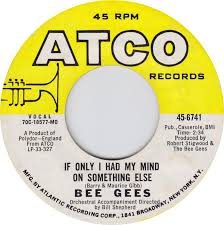| "If Only I Had My Mind on Something Else" | ||||
|---|---|---|---|---|
 | ||||
| Single by Bee Gees | ||||
| from the album Cucumber Castle | ||||
| B-side | "Sweetheart" | |||
| Released | March 1970 (US) | |||
| Recorded | 25 September 1969 [1] | |||
| Genre | Easy listening, Baroque pop | |||
| Length | 2:33 | |||
| Label | Polydor (United Kingdom) Atco (United States) | |||
| Songwriters | Barry Gibb, Maurice Gibb | |||
| Producers | Robert Stigwood, Bee Gees | |||
| Bee Gees singles chronology | ||||
| ||||
| Audio sample | ||||
"If Only I Had My Mind On Something Else" | ||||
"If Only I Had My Mind on Something Else" is a pop ballad recorded by the Bee Gees. It was written by Barry and Maurice Gibb. It was the first track on the album Cucumber Castle . A remastered version was released in 1990 on Tales from the Brothers Gibb . [2]